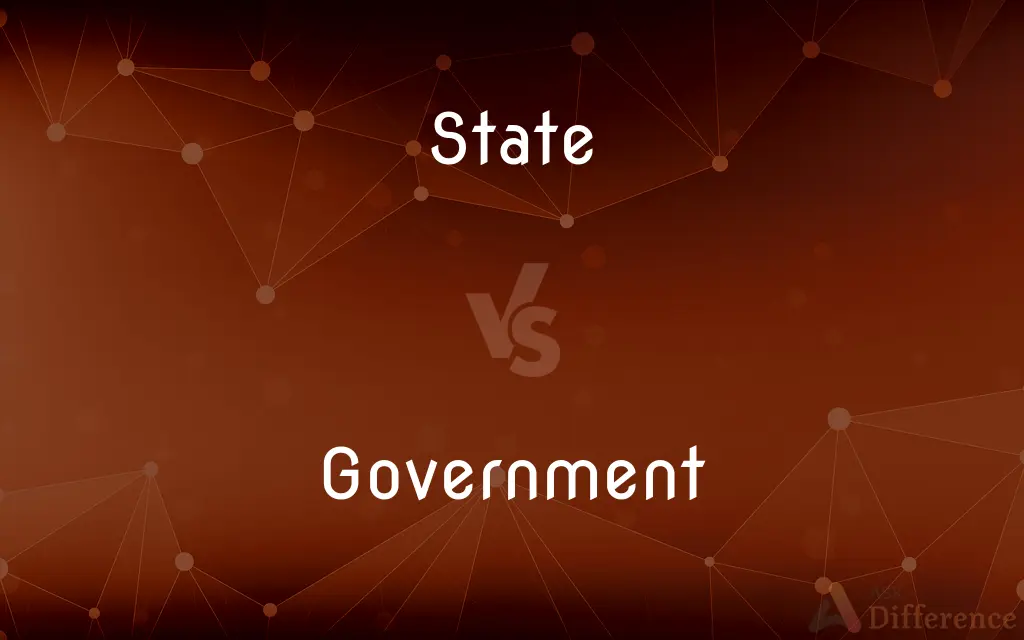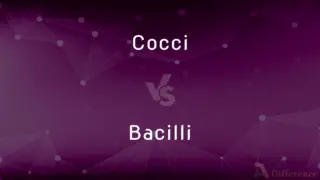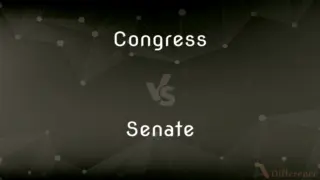State vs. Government — What's the Difference?
By Tayyaba Rehman — Updated on September 19, 2023
A "State" refers to a political entity with defined territory and sovereignty. A "Government" is the system or group governing and administering a state. The "State" is the body; the "Government" is its executive mechanism.

Difference Between State and Government
Table of Contents
ADVERTISEMENT
Key Differences
The term "State" encompasses a politically organized body of people under a single government with recognized boundaries. It's a fixed entity in terms of geography and sovereignty. On the other hand, "Government" refers to the collection of individuals and institutions that make and enforce laws within a state.
While a "State" remains consistent in its existence, the "Government" can undergo changes depending on political, social, or other factors. Elections, revolutions, or reforms can bring about changes in a government without altering the state's existence.
A "State" is an abstract concept that includes elements like population, territory, government, and sovereignty. The "Government" is a tangible and more temporary structure, composed of elected officials, bureaucracies, and agencies that function within the framework of the state.
It is essential to understand that while all states have governments, not all governments represent sovereign states. For instance, local and regional governments operate within a larger state.
In summary, a "State" is a territorial and sovereign entity, while "Government" is the operating mechanism that carries out the functions, decisions, and responsibilities of the state.
ADVERTISEMENT
Comparison Chart
Definition
A political entity with territory and sovereignty
The system or group governing a state
Changeability
Constant in existence
Can change based on political or social factors
Elements
Population, territory, sovereignty, and government
Elected officials, agencies, institutions
Scope
Broader in concept
More specific and operates within a state
Duration
Continuous unless dissolved or merged
Can be temporary, changing with elections or reforms
Compare with Definitions
State
A political entity with defined territorial boundaries.
Each state in the U.S. has its own laws and regulations.
Government
The means or mechanism of ruling.
Democracy is a form of government.
State
Ceremonial or dignified rank.
The ambassador met the queen in an official state visit.
Government
A government is the system or group of people governing an organized community, generally a state. In the case of its broad associative definition, government normally consists of legislature, executive, and judiciary.
State
A condition or mode of being, as with regard to circumstances
The office was in a state of confusion.
Government
The group of people with the authority to govern a country or state; a particular ministry in office
The government's economic record
Successive Labour governments
State
A condition of being in a stage or form, as of structure, growth, or development
The fetal state.
Government
The relation between a governed and a governing word.
State
A mental or emotional condition
In a manic state.
Government
The act or process of governing, especially the control and administration of public policy in a political unit.
State
(Informal) A condition of excitement or distress
Was in a state over going to the prom.
Government
The office, function, or authority of a governing individual or body.
State
Social position or rank.
Government
Exercise of authority in a political unit; rule.
State
(Physics) The condition of a physical system with regard to phase, form, composition, or structure
Ice is the solid state of water.
Government
The agency or apparatus through which a governing individual or body functions and exercises authority.
State
Ceremony; pomp
Foreign leaders dining in state at the White House.
Government
The ruling political party or coalition of political parties in a parliamentary system.
State
The supreme public power within a sovereign political entity
The state intervening in the economy.
Government
The cabinet in a parliamentary system.
State
The sphere of supreme civil power within a given polity
Matters of state.
Government
The persons who make up a governing body.
State
A specific kind of government
The socialist state.
Government
A system or policy by which a political unit is governed.
State
A body politic, especially one constituting a nation
The states of Eastern Europe.
Government
Administration or management of an organization, business, or institution.
State
One of the more or less internally autonomous territorial and political units composing a federation under a sovereign government
The 48 contiguous states of the Union.
Government
Political science.
State
Of or relating to a body politic or to an internally autonomous territorial or political unit constituting a federation under one government
A monarch dealing with state matters.
The department that handles state security.
Government
(Grammar) The influence of a word over the morphological inflection of another word in a phrase or sentence.
State
Owned and operated by a state
State universities.
Government
The body with the power to make and/or enforce laws to control a country, land area, people or organization.
British government has historically centred exclusively on London.
State
To set forth in words; declare.
Government
The relationship between a word and its dependents.
State
A condition; a set of circumstances applying at any given time.
A state of being
A state of emergency
Government
The state and its administration viewed as the ruling political power.
If the citizens must follow the law, then the government must follow the constitution.
State
(physics) A complete description of a system, consisting of parameters that determine all properties of the system.
Government
(uncountable) The management or control of a system.
State
A mess; disorder.
Absolute state
In a state
Government
The tenure of a chief of state.
State
(computing) The stable condition of a processor during a particular clock cycle.
In the fetch state, the address of the next instruction is placed on the address bus.
Government
The act of governing; the exercise of authority; the administration of laws; control; direction; regulation; as, civil, church, or family government.
State
(computing) The set of all parameters relevant to a computation.
The state here includes a set containing all names seen so far.
Government
The mode of governing; the system of polity in a state; the established form of law.
That free government which we have so dearly purchased, free commonwealth.
State
(computing) The values of all parameters at some point in a computation.
A debugger can show the state of a program at any breakpoint.
Government
The right or power of governing; authority.
I here resign my government to thee.
State
(sciences) The physical property of matter as solid, liquid, gas or plasma.
Government
The person or persons authorized to administer the laws; the ruling power; the administration.
When we, in England, speak of the government, we generally understand the ministers of the crown for the time being.
State
(obsolete) Highest and stationary condition, as that of maturity between growth and decline, or as that of crisis between the increase and the abating of a disease; height; acme.
Government
The body politic governed by one authority; a state; as, the governments of Europe.
State
High social standing or circumstance.
Government
Management of the limbs or body.
State
Pomp, ceremony, or dignity.
In state
The President's body will lie in state at the Capitol.
Government
The influence of a word in regard to construction, requiring that another word should be in a particular case.
State
Rank; condition; quality.
Government
The organization that is the governing authority of a political unit;
The government reduced taxes
The matter was referred to higher authorities
State
Condition of prosperity or grandeur; wealthy or prosperous circumstances; social importance.
Government
(government) the system or form by which a community or other political unit is governed;
Tyrannical government
State
A chair with a canopy above it, often standing on a dais; a seat of dignity; also, the canopy itself.
Government
The act of governing; exercising authority;
Regulations for the governing of state prisons
He had considerable experience of government
State
(obsolete) A great person, a dignitary; a lord or prince.
Government
The study of government of states and other political units
State
(obsolete) Estate, possession.
Government
The system by which a community or state is controlled.
The government announced tax reforms.
State
A polity.
Government
The group of people governing an organized community.
The government faced criticism for its policies.
State
Any sovereign polity; a national or city-state government.
Government
The tenure of a particular ruling group.
The current government has been in power for four years.
State
A political division of a federation retaining a notable degree of autonomy, as in the United States, Mexico, Nigeria, or India.
Government
The management or control of a system.
The government of a school is essential for its smooth operation.
State
(obsolete) A form of government other than a monarchy.
State
(anthropology) A society larger than a tribe. A society large enough to form a state in the sense of a government.
State
An element of the range of the random variables that define a random process.
State
The lexical aspect (aktionsart) of verbs or predicates that do not change over time.
State
(transitive) To declare to be a fact.
He stated that he was willing to help.
State
(transitive) To make known.
State your intentions.
State
(obsolete) Stately.
State
The circumstances or condition of a being or thing at any given time.
State is a term nearly synonymous with "mode," but of a meaning more extensive, and is not exclusively limited to the mutable and contingent.
Declare the past and present state of things.
Keep the state of the question in your eye.
State
Rank; condition; quality; as, the state of honor.
Thy honor, state, and seat is due to me.
State
Condition of prosperity or grandeur; wealthy or prosperous circumstances; social importance.
She instructed him how he should keep state, and yet with a modest sense of his misfortunes.
Can this imperious lord forget to reign,Quit all his state, descend, and serve again?
State
Appearance of grandeur or dignity; pomp.
Where least of state there most of love is shown.
State
A chair with a canopy above it, often standing on a dais; a seat of dignity; also, the canopy itself.
His high throne, . . . under stateOf richest texture spread.
When he went to court, he used to kick away the state, and sit down by his prince cheek by jowl.
State
Estate; possession.
Your state, my lord, again is yours.
State
A person of high rank.
State
The principal persons in a government.
The bold designPleased highly those infernal states.
State
The bodies that constitute the legislature of a country; as, the States-general of Holland.
State
A form of government which is not monarchial, as a republic.
Well monarchies may own religion's name,But states are atheists in their very fame.
State
A political body, or body politic; the whole body of people who are united under one government, whatever may be the form of the government; a nation.
Municipal law is a rule of conduct prescribed by the supreme power in a state.
The Puritans in the reign of Mary, driven from their homes, sought an asylum in Geneva, where they found a state without a king, and a church without a bishop.
State
In the United States, one of the commonwealths, or bodies politic, the people of which make up the body of the nation, and which, under the national constitution, stand in certain specified relations with the national government, and are invested, as commonwealths, with full power in their several spheres over all matters not expressly inhibited.
State
Highest and stationary condition, as that of maturity between growth and decline, or as that of crisis between the increase and the abating of a disease; height; acme.
I do not, brother,Infer as if I thought my sister's stateSecure without all doubt or controversy.
We hoped to enjoy with ease what, in our situation, might be called the luxuries of life.
And, O, what man's condition can be worseThan his whom plenty starves and blessings curse?
State
A statement; also, a document containing a statement.
State
Stately.
State
Belonging to the state, or body politic; public.
State
To set; to settle; to establish.
I myself, though meanest stated,And in court now almost hated.
Who calls the council, states the certain day.
State
To express the particulars of; to set down in detail or in gross; to represent fully in words; to narrate; to recite; as, to state the facts of a case, one's opinion, etc.
State
The group of people comprising the government of a sovereign state;
The state has lowered its income tax
State
The territory occupied by one of the constituent administrative districts of a nation;
His state is in the deep south
State
A politically organized body of people under a single government;
The state has elected a new president
African nations
Students who had come to the nation's capitol
The country's largest manufacturer
An industrialized land
State
The way something is with respect to its main attributes;
The current state of knowledge
His state of health
In a weak financial state
State
The federal department in the UnitedStates that sets and maintains foreign policies;
The Department of State was created in 1789
State
The territory occupied by a nation;
He returned to the land of his birth
He visited several European countries
State
A state of depression or agitation;
He was in such a state you just couldn't reason with him
State
(chemistry) the three traditional states of matter are solids (fixed shape and volume) and liquids (fixed volume and shaped by the container) and gases (filling the container);
The solid state of water is called ice
State
Express in words;
He said that he wanted to marry her
Tell me what is bothering you
State your opinion
State your name
State
Put before;
I submit to you that the accused is guilty
State
Indicate through a symbol, formula, etc.;
Can you express this distance in kilometers?
State
A condition or manner of existence.
The building is in a dire state of disrepair.
State
A specific stage in a process.
The water is in a solid state when frozen.
State
A division within a federation.
Texas is the second-largest state by area in the U.S.
Common Curiosities
Can a "State" change its "Government"?
Yes, through elections, reforms, or revolutions.
Can "Government" exist without a "State"?
No, a "Government" operates within the framework of a "State."
How does a "Government" serve its "State"?
By managing public affairs, maintaining order, and delivering services.
What gives a "Government" its legitimacy?
Typically, the consent of the governed within the "State."
Is every U.S. "State" a sovereign entity?
No, while U.S. "States" have powers, they're subject to the federal government.
What's the "State's" role in law-making?
The "State" provides the framework; the "Government" enacts laws.
Can "Government" policies differ within the same "State"?
Yes, especially in federations where regions have autonomy.
Who heads a "Government"?
It varies; it could be a president, prime minister, monarch, or other leaders.
Can the boundaries of a "State" change?
Yes, through agreements, wars, or other geopolitical events.
What's the primary function of a "State"?
A "State" provides a political and territorial entity where governance occurs.
Are local city councils a form of "Government"?
Yes, they're a local "Government" within a larger "State."
Do all "States" have the same form of "Government"?
No, governments vary – democracies, monarchies, dictatorships, etc.
How does the "State" ensure its existence?
Through maintaining sovereignty, order, and territorial integrity.
How are "State" and "Government" interdependent?
The "State" provides the structure; the "Government" facilitates its functions.
Why do "States" have different forms of "Governments"?
Historical, cultural, and social factors influence government forms.
Share Your Discovery

Previous Comparison
Cocci vs. Bacilli
Next Comparison
Congress vs. SenateAuthor Spotlight
Written by
Tayyaba RehmanTayyaba Rehman is a distinguished writer, currently serving as a primary contributor to askdifference.com. As a researcher in semantics and etymology, Tayyaba's passion for the complexity of languages and their distinctions has found a perfect home on the platform. Tayyaba delves into the intricacies of language, distinguishing between commonly confused words and phrases, thereby providing clarity for readers worldwide.
















































